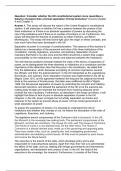Question: Consider whether the UK constitutional system more resembles a
balance of powers than a formal separation of three branches? (Covers Chapter
4 and Chapter 1)
Answer 1: This essay will discuss the nature of the United Kingdom’s constitutional
system. It will elaborate on whether UK has a balance between the powers of the
three institutions or if there is an absolute separation of powers by discussing the
role of the institutions and if there is an overlap of functions or not. Furthermore, this
essay will describe the theories of academics as Adam Tomkins, and Baron
Montesquieu. This essay will shed some light upon the origin on these concepts, and
how much have they been developed in the UK.
Separation of power is a concept of constitutionalism. The essence of this doctrine is
defined as a demarcation of the personnel and roles of the three institutions of the
constitution, namely, legislature, executive, and judiciary. Separation of power
maintains that there is no ultra vires and that there should be a system that nudges
accountability on the institutions by checks and balances between the institutions.
The well learned academic Aristotle realized the origin of the theory of separation of
power, as he distinguished the three elements or institutions of a constitution and the
importance of the distinctive roles that they play in the constitution. He stated that ‘…
first, the deliberative, which discusses everything of common importance; second,
the officials; and third, the judicial element.’ In the UK interpreted as the Legislatures,
Executives, and Judiciary. Such separation of power was implemented in the UK by
Magna Carta 1215, as this agreement between the king and his subjects set formal
limits to the exercise of formal power, that later were reaffirmed by Bill of Rights
1689, this bill assured separation of powers by restricting the monarch and initiating
democratic elections, and allowed the parliament of the UK to be the supreme law
making body till date and restricted the monarch from resolving disputes which
invoked the role of judiciary. Furthermore, as described in the essay as follows, it will
highlight that there is lack of pure or absolute separation of power in the UK.
However, in the UK, power is largely but not wholly separated, as checks and
balances in the system to prevent abuse of power. UK has mixed government or
weak separation of power.
To assess the separation of powers it is essential to understand the role of
institutions and whether they overlap or not. As follows the description of the roles of
Legislature, Executive, and Judiciary.
The legislative branch compromises of the Parliament that is bicameral. In the UK,
the Monarch is the sovereign law-making body. The parliament compromises of the
Monarch, and has two chambers, The House of Lords, and The House of Commons.
The House of Lords is a non-elected body. On the other hand, The House of
Commons is a directly elected body, made up of the governing and opposing party.
They have certain roles, such as, passing law, and investigating government
administration and debating current issues. All bills must be passed by each house
and receive the Royal Assent.
The executive is the branch of the state, which develops policy and is also
responsible for executing those policies. Apart from that, their role is to administrate
the affairs of the state, such as, dealing with foreign governments and international
organizations, and declaration and conduct of war. In the UK, the head of the
executive is the sovereign, the monarch. Furthermore, it consists of the Prime




